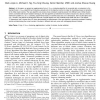Free Online Productivity Tools
i2Speak
i2Symbol
i2OCR
iTex2Img
iWeb2Print
iWeb2Shot
i2Type
iPdf2Split
iPdf2Merge
i2Bopomofo
i2Arabic
i2Style
i2Image
i2PDF
iLatex2Rtf
Sci2ools
TKDE
2008
2008
Agglomerative Fuzzy K-Means Clustering Algorithm with Selection of Number of Clusters
In this paper, we present an agglomerative fuzzy K-Means clustering algorithm for numerical data, an extension to the standard fuzzy K-Means algorithm by introducing a penalty term to the objective function to make the clustering process not sensitive to the initial cluster centers. The new algorithm can produce more consistent clustering results from different sets of initial clusters centers. Combined with cluster validation techniques, the new algorithm can determine the number of clusters in a data set, which is a well-known problem in K-Means clustering. Experimental results on synthetic data sets (2 to 5 dimensions, 500 to 5,000 objects and 3 to 7 clusters), the BIRCH two-dimensional data set of 20,000 objects and 100 cluster0and the WINE data set of 178 objects, 17 dimensions, and 3 clusters from UCI have demonstrated the effectiveness of the new algorithm in producing consistent clustering results and determining the correct number of clusters in different data sets, some with ...
| Added | 15 Dec 2010 |
| Updated | 15 Dec 2010 |
| Type | Journal |
| Year | 2008 |
| Where | TKDE |
| Authors | Mark Junjie Li, Michael K. Ng, Yiu-ming Cheung, Joshua Zhexue Huang |
Comments (0)

